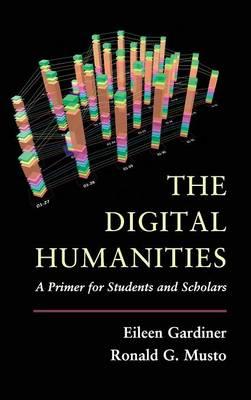Full Product Details
Author: Eileen Gardiner ,
Ronald G. Musto
Publisher: Cambridge University Press
Imprint: Cambridge University Press
Dimensions:
Width: 15.20cm
, Height: 1.70cm
, Length: 22.90cm
Weight: 0.520kg
ISBN: 9781107013193
ISBN 10: 1107013194
Pages: 288
Publication Date: 30 June 2015
Audience:
Professional and scholarly
,
College/higher education
,
Professional & Vocational
,
Tertiary & Higher Education
Format: Hardback
Publisher's Status: Active
Availability: Manufactured on demand

We will order this item for you from a manufactured on demand supplier.
Reviews
'Deep scholarship and lively engagement with a vast range of contemporary innovations animate this concise, reliable, indeed almost indispensable book.' James J. O'Donnell, author of Avatars of the Word 'Here is the rare publication that offers an insider's deep understanding of the humanities as well as the practitioner's experience of the digital. A wealth of theoretical and technical information is on offer, including an invaluable compendium of resources for the aspiring researcher. But the book's crucial insight is that the fundamental issues shaping this arena are cultural, not technological.' Gail Feigenbaum, Getty Research Institute 'This remarkably intelligent and lucid book explains how the emergence of the digital world has created remarkable opportunities for gains in knowledge through the practice of the humanities. This book, providing a useful appendix and glossary, will lead students and scholars alike to think afresh about why they consider knowledge, its sources, and its representation the way they do.' Nicola Courtright, Amherst College
'Deep scholarship and lively engagement with a vast range of contemporary innovations animate this concise, reliable, indeed almost indispensable book.' James J. O'Donnell, author of Avatars of the Word 'Here is the rare publication that offers an insider's deep understanding of the humanities as well as the practitioner's experience of the digital. A wealth of theoretical and technical information is on offer, including an invaluable compendium of resources for the aspiring researcher. But the book's crucial insight is that the fundamental issues shaping this arena are cultural, not technological.' Gail Feigenbaum, Getty Research Institute 'This remarkably intelligent and lucid book explains how the emergence of the digital world has created remarkable opportunities for gains in knowledge through the practice of the humanities. This book, providing a useful appendix and glossary, will lead students and scholars alike to think afresh about why they consider knowledge, its sources, and its representation the way they do.' Nicola Courtright, Amherst College Deep scholarship and lively engagement with a vast range of contemporary innovations animate this concise, reliable, indeed almost indispensable book. James J. O'Donnell, author of Avatars of the Word Here is the rare publication that offers an insider's deep understanding of the humanities as well as the practitioner's experience of the digital. A wealth of theoretical and technical information is on offer, including an invaluable compendium of resources for the aspiring researcher. But the book's crucial insight is that the fundamental issues shaping this arena are cultural, not technological. Gail Feigenbaum, Getty Research Institute This remarkably intelligent and lucid book explains how the emergence of the digital world has created remarkable opportunities for gains in knowledge through the practice of the humanities. This book, providing a useful appendix and glossary, will lead students and scholars alike to think afresh about why they consider knowledge, its sources, and its representation the way they do. Nicola Courtright, Amherst College
Advance praise: 'Deep scholarship and lively engagement with a vast range of contemporary innovations animate this concise, reliable, indeed almost indispensable book.' James J. O'Donnell, author of Avatars of the Word Advance praise: 'Here is the rare publication that offers an insider's deep understanding of the humanities as well as the practitioner's experience of the digital. A wealth of theoretical and technical information is on offer, including an invaluable compendium of resources for the aspiring researcher. But the book's crucial insight is that the fundamental issues shaping this arena are cultural, not technological.' Gail Feigenbaum, Getty Research Institute Advance praise: 'This remarkably intelligent and lucid book explains how the emergence of the digital world has created remarkable opportunities for gains in knowledge through the practice of the humanities. This book, providing a useful appendix and glossary, will lead students and scholars alike to think afresh about why they consider knowledge, its sources, and its representation the way they do.' Nicola Courtright, Amherst College
Author Information
Eileen Gardiner is co-founder and co-publisher of Italica Press. She has served as director of ACLS Humanities E-Book, executive director of The Medieval Academy of America, and co-editor of Speculum: A Journal of Medieval Studies. She is author of Visions of Heaven and Hell Before Dante, Medieval Visions of Heaven and Hell, The Pilgrim's Way to St Patrick's Purgatory, and Hell-on-Line, a website on the infernal otherworld in various traditions. Ronald G. Musto is co-founder and co-publisher of Italica Press. He has served as director of ACLS Humanities E-Book, co-executive director of The Medieval Academy of America, and editor of Speculum: A Journal of Medieval Studies. He has taught at New York University, Duke University, North Carolina and Columbia University, New York, and has held American Academy in Rome, National Endowment for the Humanities and Mellon Foundation fellowships. He has published nine books and various articles, including Apocalypse in Rome and Renaissance Society and Culture (co-edited with John Monfasani).




